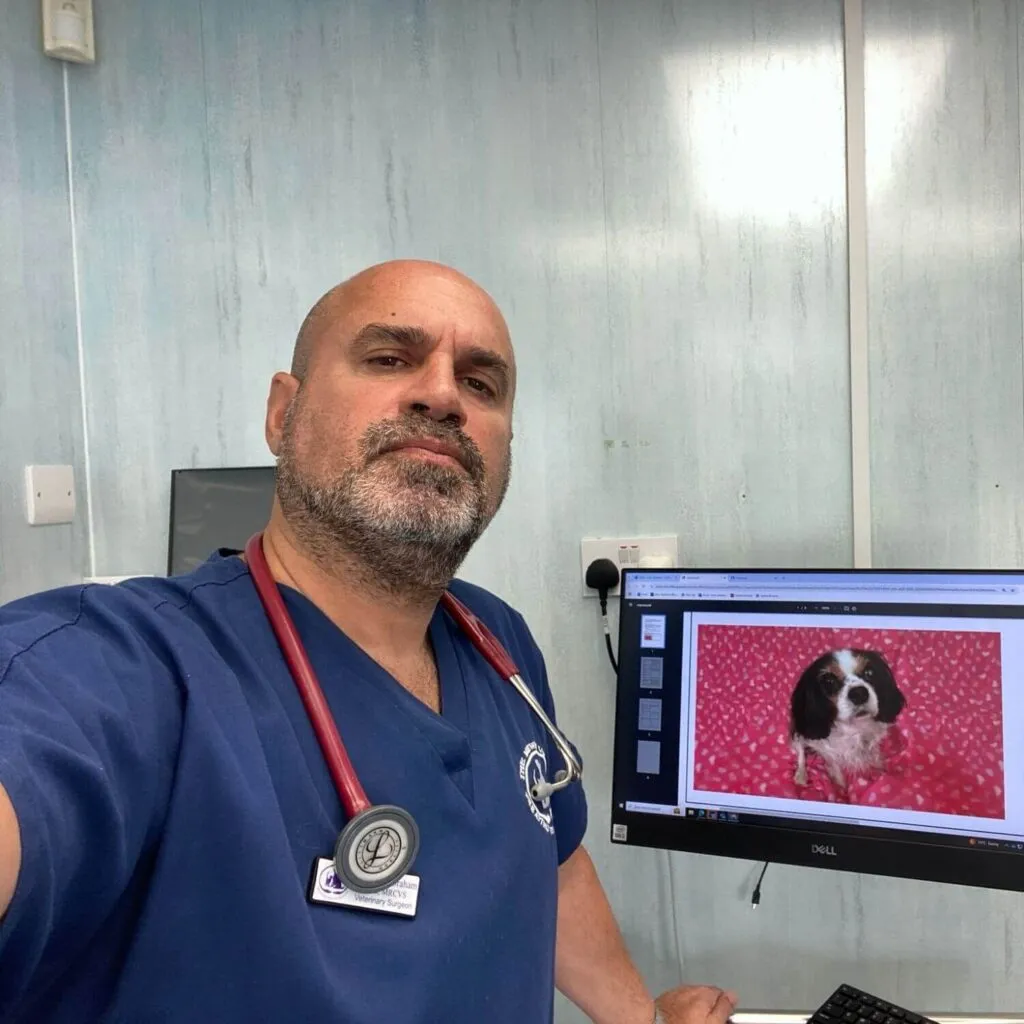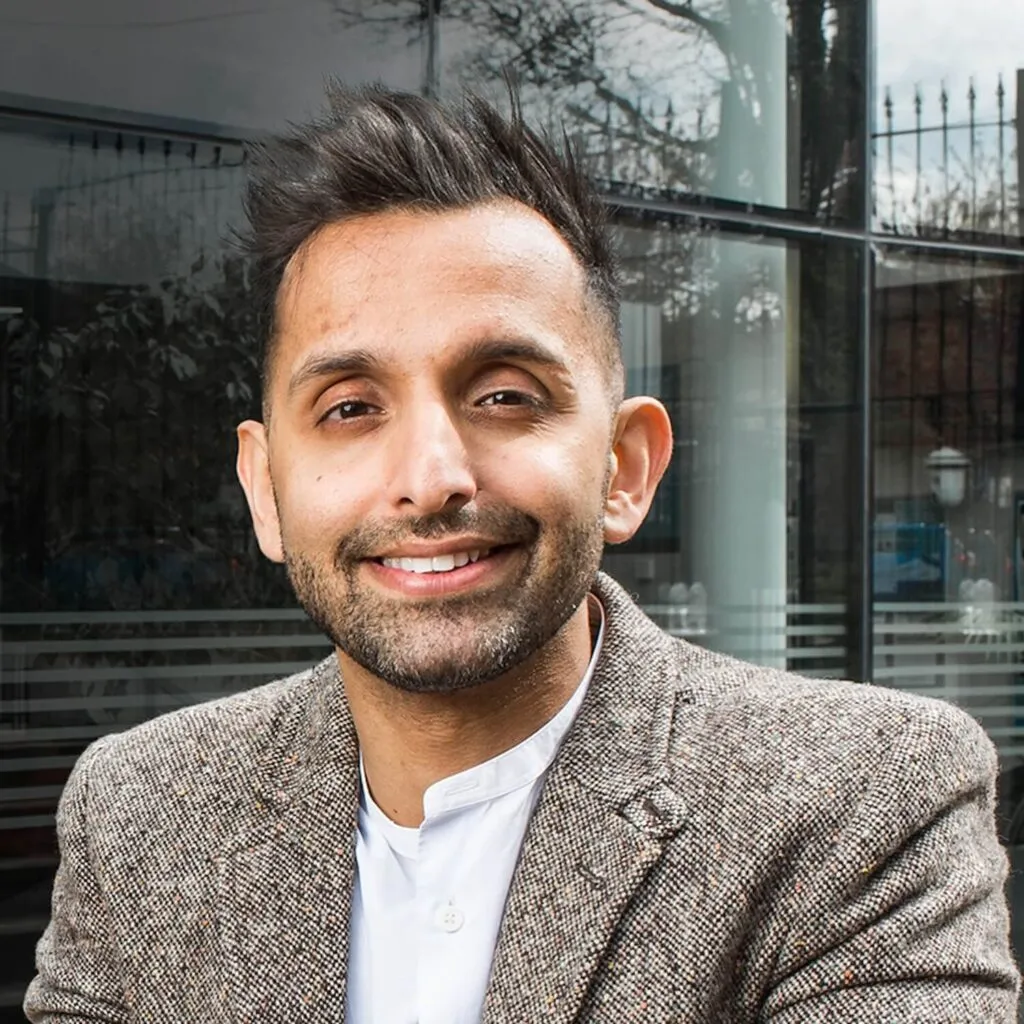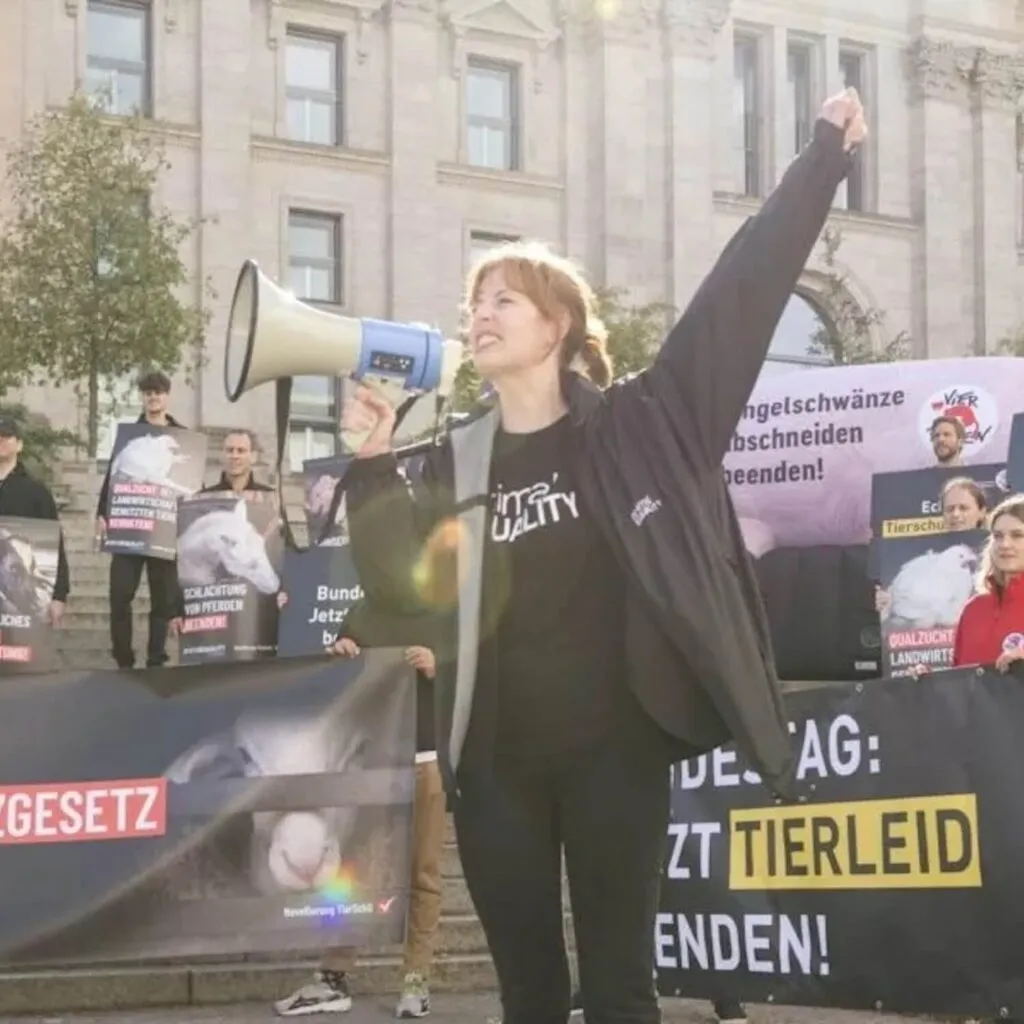Celebrating 13 years of animal protection in India
Explore the remarkable journey of Amruta Ubale and her team, who helped lead the charge for animal protection in India 13 years ago through dedicated animal advocacy.
“Here you are again”, the Indian Ministry of Foreign Trade receptionist said with a hint of humour in his eyes. Before him stood a woman with a determined look, her arms filled with stacks of paperwork and years of research.
Amruta Ubale had been to this office many times between 2012 and 2014, all with the same purpose: to secure an import ban on one of the cruellest foods in the world – foie gras.
This would not be the first time, nor the last, that Animal Equality India’s Executive Director would find herself in high offices. Since its founding on 6th October 13 years ago, Animal Equality in India has paved the way for increased animal protections in the most populated nation on the planet.
At its helm was none other than Amruta, who shuffled the papers in her arms, lifted her head in determination, and took action into her own hands.
Navigating bureaucracy in the fight against foie gras
Just a few years before Amruta appeared at the Indian Ministry of Foreign Trade, Animal Equality released investigative footage from foie gras farms in France and Spain. Ducks and geese with broken beaks and bloodied bodies were force-fed high-calorie food to fatten their livers, producing a ‘luxury’ dish served at high-end restaurants.
One Indian company was importing these fattened livers from one of these farms, where Amruta took up a banner and launched her battle against animal cruelty. In the coming years, Amruta learned to navigate through bureaucracy with poise.
“As it is with any government office in India, they are known to keep making you run from pillar to post for years”, she shared. “I was told that our representation file has moved from one department to another”. Still, Amruta knew that India’s Prevention of Cruelty to Animals Act was on her side. The production of any product involving force-feeding is considered unnecessary suffering in India which is illegal under this act. By that logic, the same standard should apply to imported products – an argument she presented to the Government.
After making her rounds at various offices with leading officials in India, she finally encountered appropriate officials at the Ministry of Foreign Trade, who helped the process along. After the judgement was given and the ban became official, the determined Amruta thanked those who had helped her.
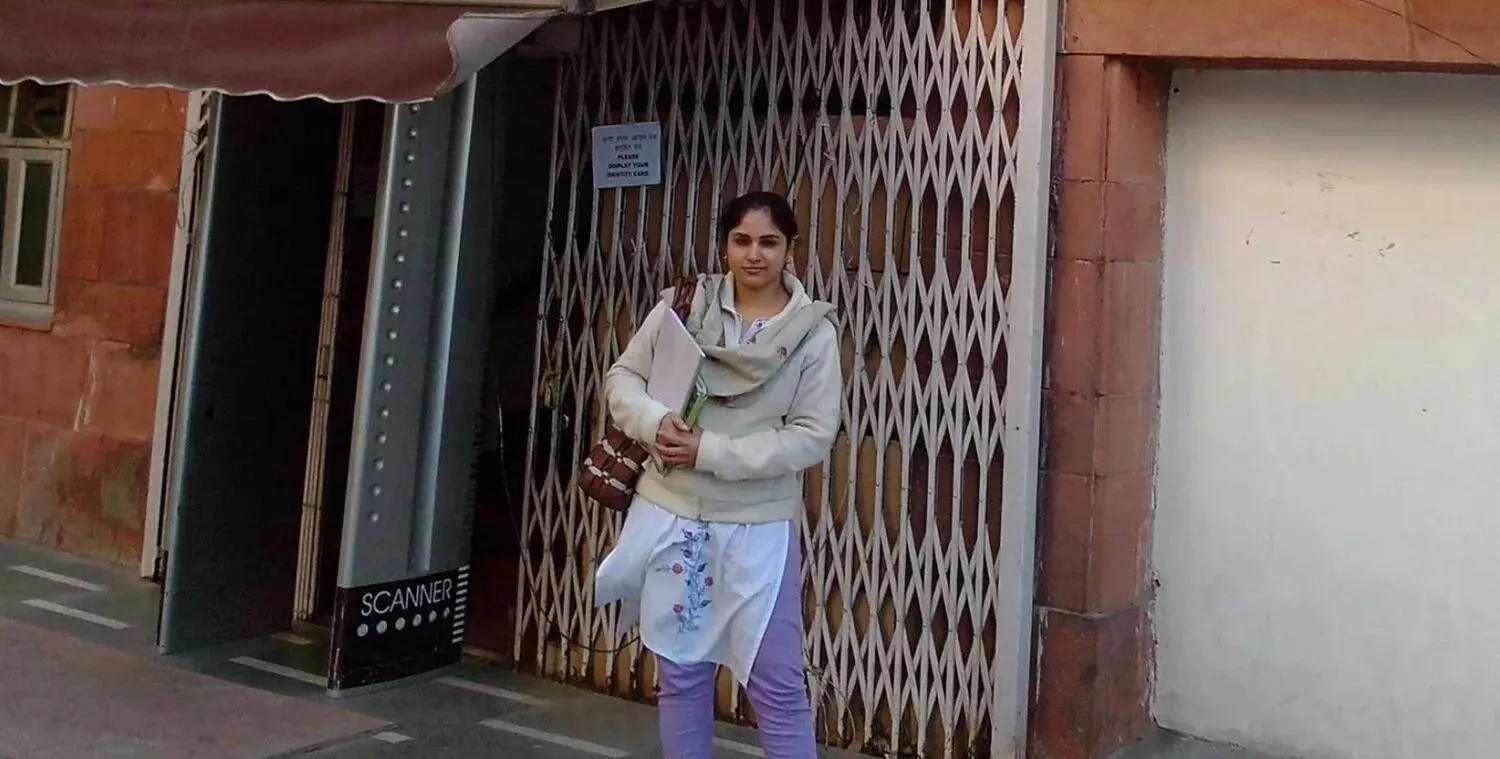
“I didn’t do anything; it was your perseverance”, one official responded.
Years later, when asked about securing a foie gras ban, Amruta’s determination was still apparent. “At first, I felt relieved that we were able to create this impact for the animals. And later, I felt that we finally bore fruits for the two years of consistent follow up”, she confided.
Defending animals from India to Nepal
While Amruta’s battle against foie gras in India reverberated to producers in Europe, this was not her last time taking an international approach. Her next target was the animal sacrifice at Nepal’s Gadhimai Festival.
During this festival, which is held every five years, next due to be held 8th December this year, attendees slaughter thousands of animals in ritual sacrifice through beheading and/or hacking them to death with machetes. Animal Equality’s investigators found sexual abuse of animals in the temple, calves dying in cold temperatures, and attendees cutting animals’ ears off and leaving them to bleed. Others were hung upside-down on bicycles.
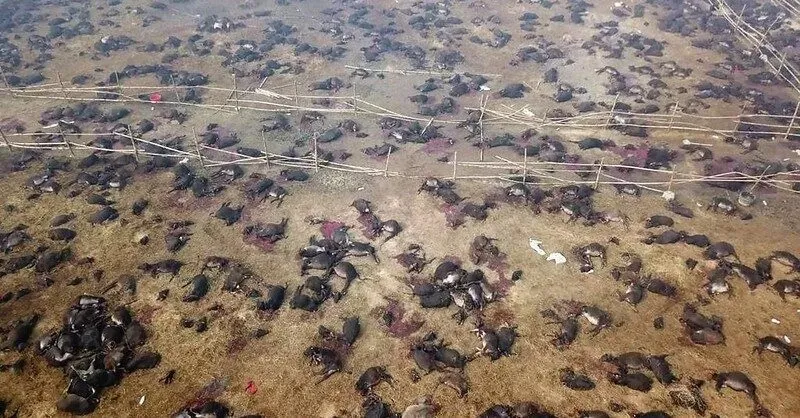
Far from faint of heart, Amruta stepped into this massive slaughter to witness it first-hand in 2014 and 2019.
“[T]hey are killed by inexperienced men… to ‘appease’ the deity,” she described solemnly. “It was heart-wrenching to see defenceless animals were paying the price with their lives for the devotees being clouded by superstition, which was encouraged by the temple committee who gained financially from the animal sacrifice”.
As if witnessing the slaughter of thousands of animals wasn’t enough, Amruta was encircled by local men who were angry with her efforts to stop animal sacrifice. In the border region of Nepal, outside one of the border patrol offices, violent crime is rife, and murder is common.
“I know it was a very precarious situation”, Amruta explained. “I spoke to the leader and told him, I’m willing to talk with him, only if he asks everyone to disperse”. But this close brush with confrontation only fuelled her fire.
Because most of the attendees are Indian travellers who bring their animals to Nepal for the festival, Amruta knew where she must begin. Just in time for the 2014 festival, she secured an order from the Ministry of Home Affairs to prevent the transportation of animals over the India-Nepal border for sacrifice. This order was directed to the border police, who were tasked with preventing these crossings.
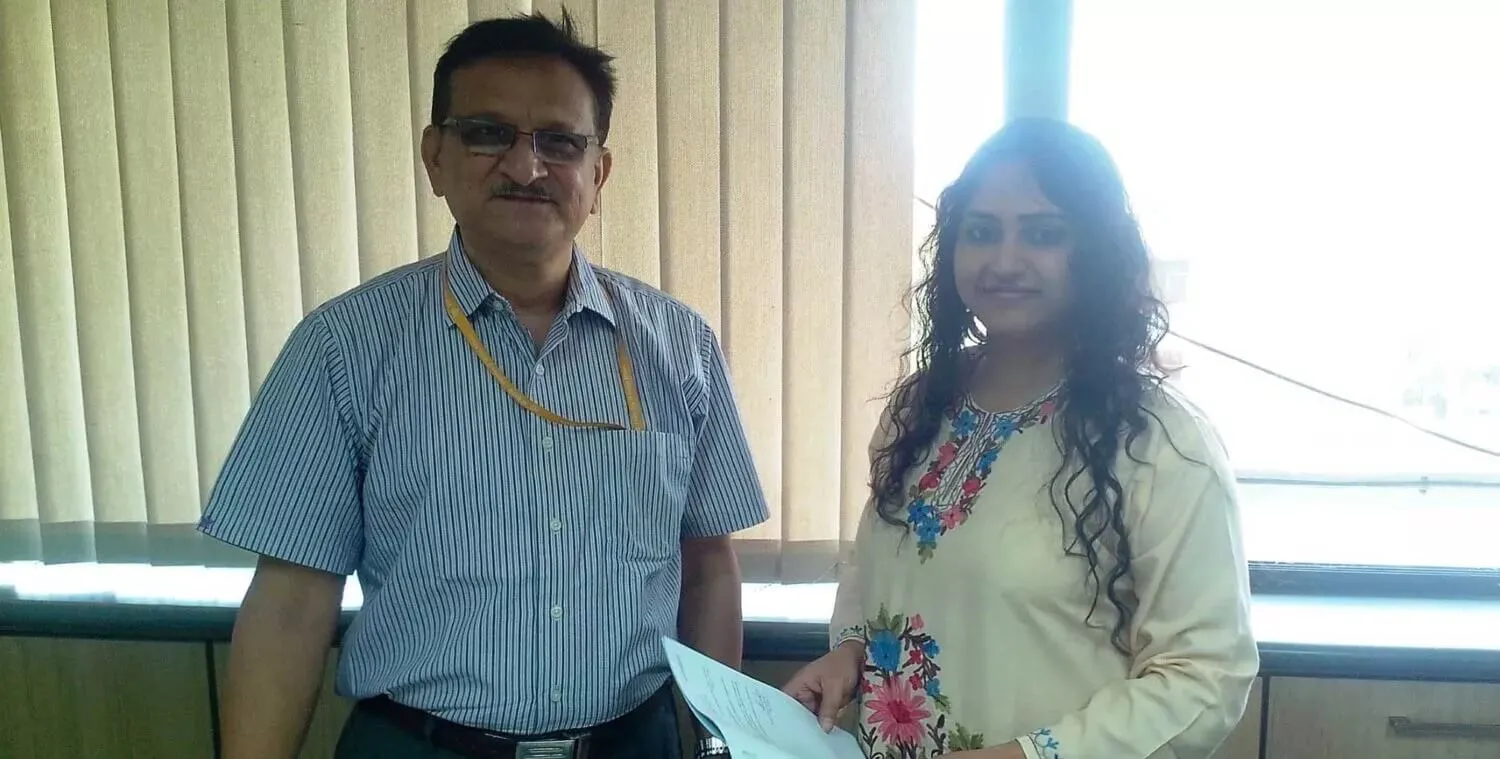
Amruta then built a team of volunteers to help the border police implement the order at checkpoints along the border. Together, they prevented approximately 2,000 animals from crossing.
Thanks to Amruta and her team’s efforts, the number of animals sacrificed was reduced by 70%, from 200,000 in 2009 to 30,000 in 2014. In 2019, they paired with the Red Cross Society of Nepal to organise a blood donation camp, where attendees could give their own blood to honour deities instead of slaughtering animals.
Cracking open the truth inside India’s Egg Farms
Beyond her advocacy against foie gras and activism at the Gadhimai Festival, Amruta and her team have been uncovering the roots of animal cruelty on farms.
Last year, they investigated 19 egg farms, revealing the harsh conditions of India’s egg industry. “Walking into those farms was gut-wrenching”, Amruta reflected. “Hens were crammed into cages no bigger than two sheets of paper, their claws deformed. Many suffered slow, agonising deaths without any medical care”.
Armed with powerful footage and polling data showing widespread public support for stronger animal protection laws, Amruta is pushing for change. Her team is urging egg producers to abandon caged systems – and progress is already visible.
“Many food companies have started sourcing eggs from cage-free farms, and some egg producers have expanded their cage-free facilities. This proves that this initiative is here to stay. Now, we only hope the government will support this initiative by phasing out cages”, Amruta noted.
Her team is also addressing other cruel practices, such as the mass killing of male chicks, deemed ‘worthless’ because they can’t lay eggs. She has submitted a study to the Indian Government illustrating how farmers can transition to cage-free systems and is advocating to end these practices.
Exposing India’s dairy farms and slaughterhouses
The focus of Amruta and her team extends beyond egg farms to include dairy farms and slaughterhouses.
“Just weeks ago, we released footage from six facilities in Maharashtra and Kerala, and what we uncovered was shocking,” Amruta explained. “We witnessed animals being milked one last time before they were callously sent off for illegal slaughter, as if their lives held no value beyond the purpose humans impose upon them for the sake of profit”.
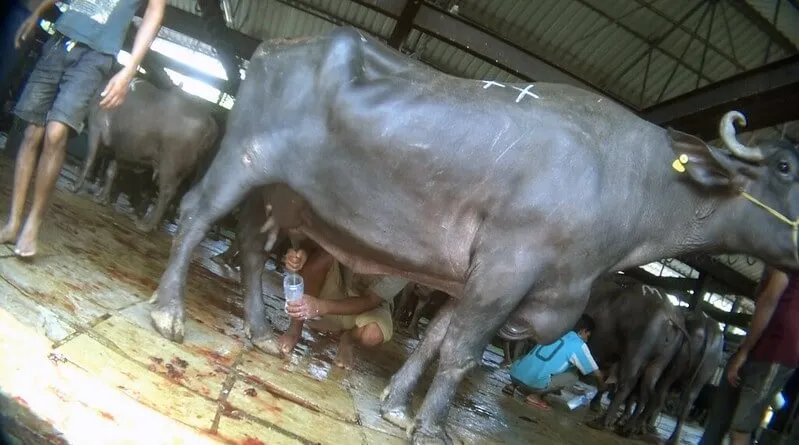
The footage revealed disturbing scenes: “Cows’ and buffaloes’ throats were repeatedly slit, often failing to kill them with a single cut. Animals were slaughtered in full view of one another, disregarding laws that require separate spaces for stunning”. While workers sometimes covered the animals’ eyes, the terrified creatures could still hear the cries of those being killed nearby.
In a country where a significant portion of the population is vegetarian and many regard cows as sacred, this stark reality is particularly unsettling. The interconnectedness of the dairy and meat industries is undeniable; the very cows that are milked are often sent to slaughter shortly after. “This investigation has revealed how intertwined these industries truly are”, Amruta noted.
With major media outlets like india.com, the Times of India, Times Now and Hindustan Times reporting our findings from the dairy industry and slaughterhouses, there is no doubt our footage has compelled many to reconsider their dairy consumption and sparked a national conversation about the treatment of these animals.
Eating the way to a better future
Exposing the harsh conditions animals endure on farms and securing widespread media coverage is just one way Amruta and Animal Equality’s team in India are urging people to reconsider their dietary choices. They’re also empowering people to leave animal products behind by promoting delicious plant-based foods on a grand scale too!
Over the years they have reached out to hundreds of thousands of people in colleges, schools and corporate offices, educating them about the cruelties inflicted on farmed animals and have published several plant-based recipe videos.
These videos have also included partnerships with several Indian celebrities which have amplified India’s plant-based program, Love Veg. From renowned entrepreneurs like Gulnar Virk Krishna and actors like Aadarsh Balakrishna and Eesha Gulati, these collaborations have inspired many followers to join our mission.
Reflecting on 13 years of impact
Since its founding 13 years ago today, Animal Equality in India has remained steadfast in its mission to create a world where all animals are respected and protected.
They are one of the few organisations in India to have gained media coverage not only from renowned Indian outlets but also internationally, including CTV News in Canada, the Wall Street Journal in the USA, Dagens Næringsliv and Nettavisen in Norway, TV5 Monde and France24 in France and IndexHR in Croatia. The list goes on.
Last year, Amruta herself was even recognised by one of India’s popular magazines, Femina, where she was featured as one of the fearless ‘Women Entrepreneurs Paving the Way for India‘.
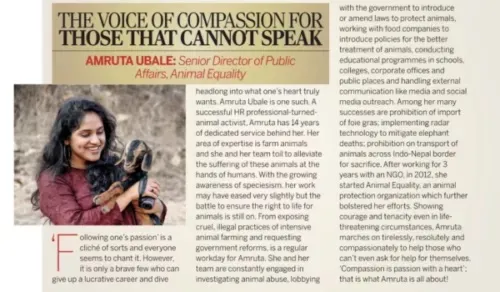
From securing a foie gras import ban and challenging mass slaughter at the Gadhimai Festival to conducting headline-making investigations and launching a celebrity-backed plant-based programme, Amruta and her team are unstoppable.
You, too, can become a part of this mission today. By eating a plant-based meal, you can join in the anniversary celebration and contribute to a compassionate future for animals.
Amruta’s journey serves as a reminder that each of us has the power to make a difference, one choice at a time. What will your choice be?
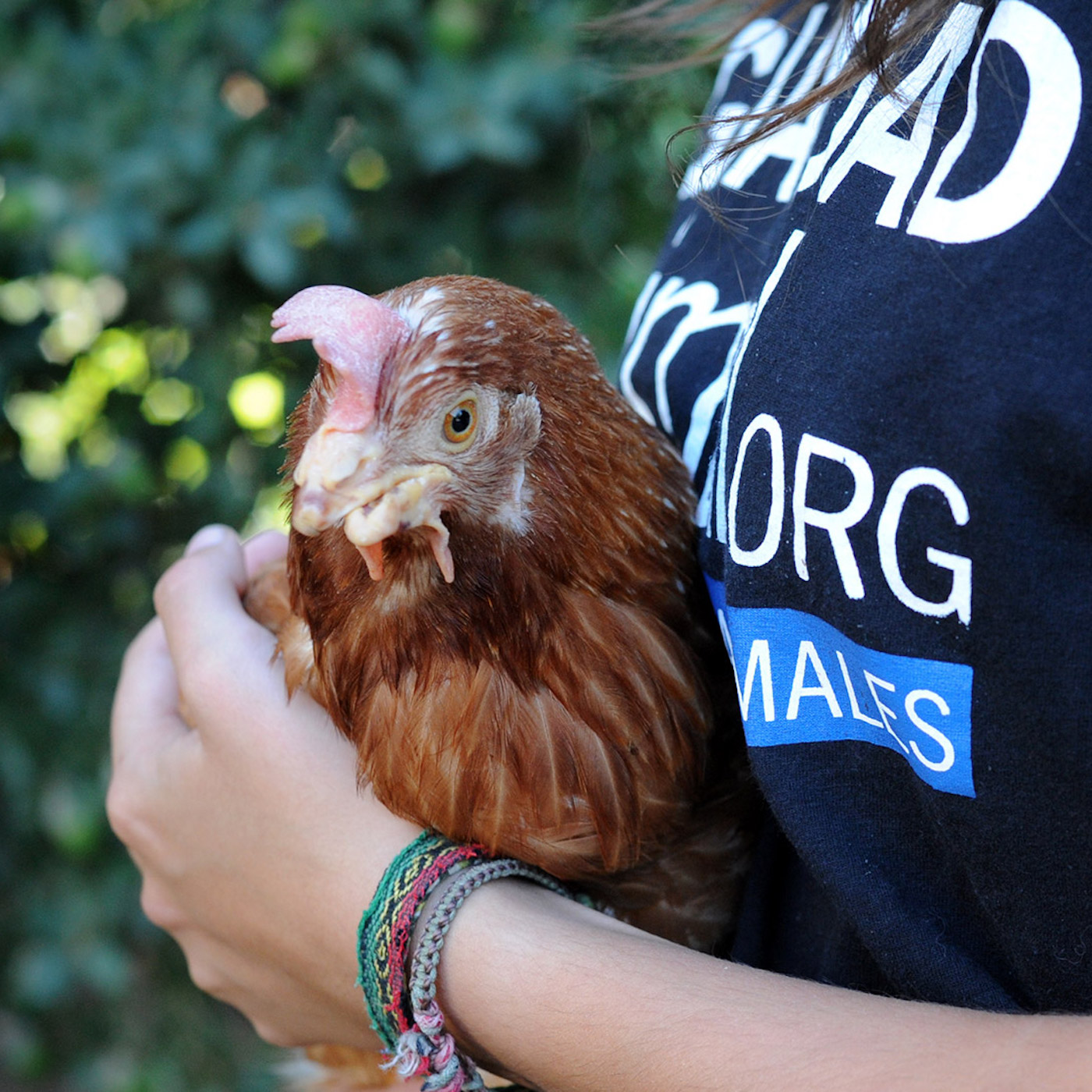
save animals, eat plant based
As a consumer, you hold the power to protect animals from the meat industry. Every plant-based meal saves animals from a life of misery in factory farms and slaughterhouses.
Recommended
